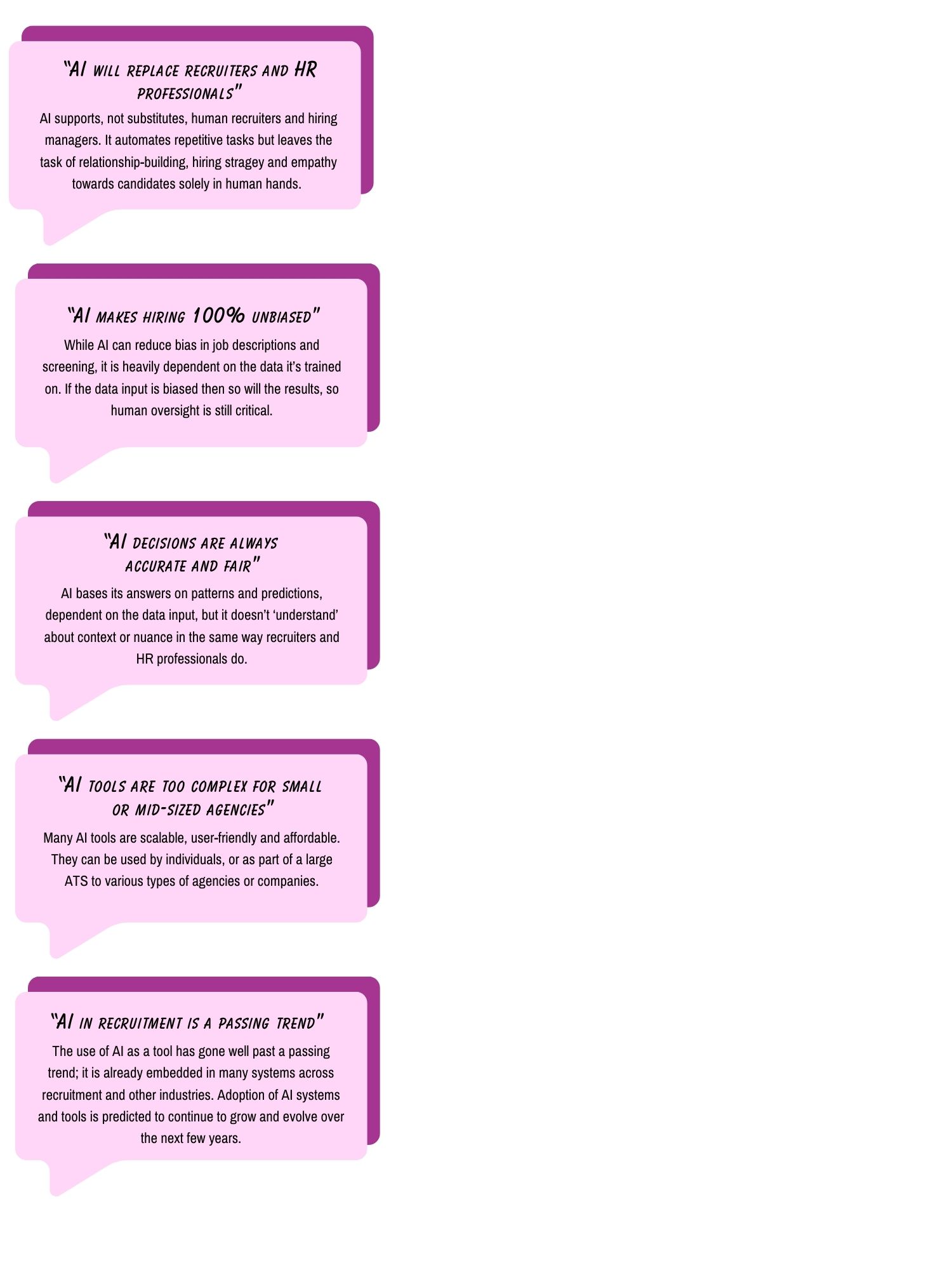AI is fast becoming one of the most talked-about technologies of our time, sparking debate and driving transformation across industries and into our everyday lives.
From the way we listen to music or get directions, to how businesses make decisions and communicate, AI is integrating into many areas of day-to-day life. At its core, it’s a kind of technology that can learn, make choices, and solve problems, with many seeing it as a vital tool in their work and home life.
In the world of recruitment, AI is already making its mark. This blog explores how AI is reshaping recruitment, the existing and new ways it is being used by recruiters and hiring managers, and some common myths about this new technology.
Existing AI already in recruitment
AI isn’t a distant concept in the recruitment industry; it’s been around for many decades. However, in recent years it has advanced considerably to adapt to the rise in workload for many recruiters and hiring professionals.
Applicant Tracking Systems (ATS)
The application of AI into Applicant Tracking Systems is a primary use of AI in recruitment; refining searches and improving speed and relevance.
Automated ATS has been around since the 1990s and early 2000s, and used specific criteria such as job experience, education and other relevant factors to evaluate applications.
So, the purpose of Applicant Tracking Systems hasn’t changed much over the years, only improved and adapted to increase productivity, reduce time-to-hire in a heavily competitive job market, and improve overall candidate experience with AI systems in place.
Chatbots & scheduling automation
Like ATS, chatbots have been around for many decades already, with the first being introduced in the 1960s, and have evolved with new technology. Many companies, including recruitment agencies, use chatbots and automated scheduling to streamline candidate registration and to standardise processes.
The future of AI
There are many other areas that AI can be applied within recruitment and hiring, all aimed at making life easier, more streamlined and fair for both employers and workers. Here are some newer ways that AI can be used in recruitment:
Job description creation
A common use of AI is for support with writing content, and this is becoming increasingly popular with hiring professionals to write job descriptions. AI tools can analyse the wording and suggest changes based on readability and inclusive language, and help to avoid generic phrasing or stale templates.
Social content
Recruiters wear a lot of hats in their role, and promotion through social media is a useful skill to have. AI tools can help to generate promotional wording, suggest visuals and recommend the best times to post content. For those new to social media, this can be especially helpful.
Market intelligence
AI is all about data, so using it to analyse specific markets and suggest trends is an understandable use for the technology. Although still requiring human evaluation and safeguards around sensitive data, AI is able to research and provide analysis of data significantly faster, and as a tool can mean a more streamlined and productive process.
Myths about AI
As a major talking point for many, it’s not surprising that the development of AI has come with many misconceptions about its use. Here are some common myths about AI in recruitment:

AI is already shaping recruitment, from smarter screening and scheduling to more inclusive job descriptions and insightful market forecasts. While it can be seen as a looming threat for the industry, the reality is that AI is a tool and works best when paired with human insight and thinking.
These figures make one thing clear: while candidates increasingly accept AI as part of the hiring experience, it’s not a substitute for genuine human connection. Recruiters who embrace it mindfully can free up time, enhance candidate experiences, and make better-informed decisions, without losing the personal touch that truly makes a difference.
While AI develops across the recruitment industry, our approach is to integrate technology with the human touch. Alongside our Berry Recruitment Jobs app, we interview candidates face to face to ensure we understand them, their career goals and aspirations, whilst ensuring these align with our client’s requirements to the long-term benefit of both our candidates and clients.
Get in touch with our team today is you’re looking for work or support with hiring.
